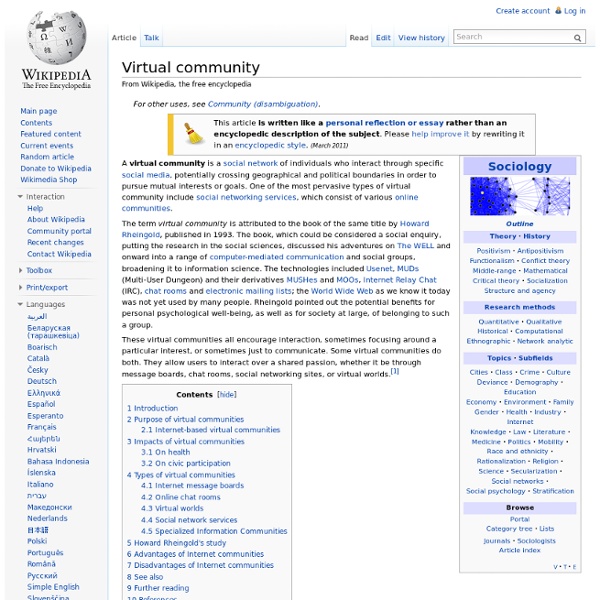User-centered design
The chief difference from other product design philosophies is that user-centered design tries to optimize the product around how users can, want, or need to use the product, rather than forcing the users to change their behavior to accommodate the product. UCD models and approaches[edit] For example, the user-centered design process can help software designers to fulfill the goal of a product engineered for their users. User requirements are considered right from the beginning and included into the whole product cycle. These requirements are noted and refined through investigative methods including: ethnographic study, contextual inquiry, prototype testing, usability testing and other methods. Generative methods may also be used including: card sorting, affinity diagraming and participatory design sessions. Cooperative design: involving designers and users on an equal footing. All these approaches follow the ISO standard Human-centred design for interactive systems (ISO 9241-210, 2010).
Interoperability
Interoperability is the ability of making systems and organizations to work together (inter-operate). While the term was initially defined for information technology or systems engineering services to allow for information exchange,[1] a more broad definition takes into account social, political, and organizational factors that impact system to system performance.[2] The "interoperability" issue in U.S. antitrust scholar papers is considerably raising in the past two years.[3] Syntactic interoperability[edit] If two or more systems are capable of communicating and exchanging data, they are exhibiting syntactic interoperability. Specified data formats, communication protocols and the like are fundamental. Syntactical interoperability is a necessary condition for further interoperability. Semantic interoperability[edit] Cross-domain interoperability[edit] Multiple social, organizational, political, legal entities working together for a common interest and/or information exchange.[4]
Online community
A New Type of Community[edit] The idea of a community is not a new concept. What is new, however, is transferring it over into the online world. Before, a community was defined as a group from a single location. If you lived in the designated area, then you became a part of that community. The study of communities has had to adapt along with the new technologies. Online communities can congregate around a shared interest, but can be spread across multiple websites. What is particularly tricky about online communities is that their meaning can change depending on who is defining them. Content: articles, information, and news about a topic of interest to a group of people.Forums or newsgroups and email: so that your community members can communicate in delayed fashion.Chat and instant messaging: so that the community members can communicate more immediately. Although many possibilities probably come to mind some examples of successful Internet Communities are: Community Participation
Web 2.0
World Wide Web sites that use technology beyond the static pages of earlier Web sites Web 2.0 (also known as participative (or participatory)[1] web and social web)[2] refers to websites that emphasize user-generated content, ease of use, participatory culture, and interoperability (i.e., compatibility with other products, systems, and devices) for end users. The term was coined by Darcy DiNucci in 1999[3] and later popularized by Tim O'Reilly and Dale Dougherty at the first Web 2.0 Conference in 2004.[4][5][6] Although the term mimics the numbering of software versions, it does not denote a formal change in the nature of the World Wide Web,[7] but merely describes a general change that occurred during this period as interactive websites proliferated and came to overshadow the older, more static websites of the original Web.[2] Some Web 2.0 capabilities were present in the days of Web 1.0, but were implemented differently. Some common design elements of a Web 1.0 site include:[17] Search
Social media
Diagram depicting the many different types of social media There are many effects that stem from internet usage. According to Nielsen, internet users continue to spend more time with social media sites than any other type of site. At the same time, the total time spent on social media in the U.S. across PC and mobile devices increased by 99 percent to 121 billion minutes in July 2012 compared to 66 billion minutes in July 2011.[5] For content contributors, the benefits of participating in social media have gone beyond simply social sharing to building reputation and bringing in career opportunities and monetary income, as discussed in Tang, Gu, and Whinston (2012).[6] Classification of social media[edit] Social media technologies take on many different forms including blogs, business networks , enterprise social networks, forums, microblogs, photo sharing, products/services review, social bookmarking, social gaming, social networks, video sharing and virtual worlds.[7] Virality[edit]
What Is Twitter And How Does It Work – Beginners Guide - Gnoted.com
I think most of you know what Twitter is, after all I’ve been writing posts about various Twitter tools and tricks. But still I get emails and some questions in comments: “What is Twitter and how does it work?” Here’s a quick beginners guide to Twitter so from now on, everyone knows what I am talking about. (Because there will be more posts about Twitter and Twitter tools in future).



